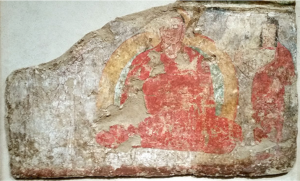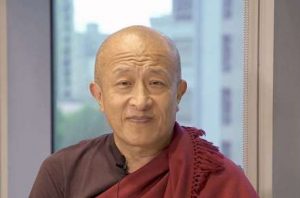
Harvard University’s T. H. Chan School of Public Health launched the Thich Nhat Hanh Center for Mindfulness in Public Health on 26 April. The center was launched after an anonymous doner gave US$25 million to the university, drawing inspiration from the late Zen master, peace activist, scholar, and mindfulness pioneer Thich Nhat Hanh (1926–2022) as it seeks to improve people’s lives through evidence-based research on mindful eating and ways to better care for the environment.
According to center’s website, its mission is to empower “people around the globe to live with purpose, equanimity, and joy through the practice of mindfulness.” (Thich Nhat Hanh Center for Mindfulness in Public Health)
“We are thrilled to host this groundbreaking center at the Harvard T. H. Chan School of Public Health,” said the dean of the faculty Michelle A. Williams. “In public health, we work at population scale—we aim to reach and uplift entire communities. The Thich Nhat Hanh Center for Mindfulness in Public Health will operate in that spirit.” (Harvard)
Lilian Cheung, director of mindfulness research and practice in the Department of Nutrition at Harvard, noted that she hoped the center would help people around the world discover the benefits of mindfulness practice. “Over the years, I became deeply interested in learning how the practice of mindfulness could be applied to the discipline of public health, which seeks to prevent disease and promote well-being at population scale. That is exactly what this Center will do.” (Harvard)
Cheung met Thich Nhat Hanh in 1997 at a mindfulness retreat and later co-authored a book with him, Savor: Mindful Eating, Mindful Life (HarperOne 2011).
According to a press release, the Thich Nhat Hanh Center for Mindfulness in Public Health will address the need to better assess the impact of mindfulness practices. They point to the existence of nearly 25,000 studies about mindfulness published in peer-reviewed journals to date.
Based on existing studies and more forthcoming, researchers at the center plan a number of research initiatives, including:
• “Minding Our Future,” which focuses on developing interdisciplinary, evidence-based programs to help people live healthier lives as they age. One strand of research will look at how mindfulness practices interwoven into daily living, including mindful design of dining spaces, menus, and shared experiences around food, can contribute to healthy longevity.
• “Eat, Move & Live Mindfully,” a curriculum that integrates lessons on nutrition, physical activity, and mindfulness to help youth establish healthy and mindful habits that are good for themselves and the health of the planet.
• A mindful eating research and education program at Harvard and beyond. (Harvard)
Professor of epidemiology and nutrition and the Center’s director, Walter Willett, said: “I am so pleased that this new center will enable the scientific study of mindfulness in the context of public health. We are looking forward to establishing the center as a hub of rigorous inquiry and to collaborating with colleagues around the world to advance the science of mindfulness.
Thich Nhat Hanh, known affectionately as Thay by his followers, became famous for his non-violent response to the Vietnam War. In 1967, Dr. Martin Luther King Jr. nominated Thich Nhat Hanh for the Nobel Peace Prize, just three years after he won the prize himself. Thich Nhat Hanh went on to found Plum Village, a large Buddhist community and retreat center in rural France, as well as a network of affiliated groups around the world. He became a prolific author and one of the early advocates for making mindfulness practice widely accessible.
The center is based in Harvard’s Department of Nutrition, and from there plans to collaborate with scholars across disciplines and modalities. The center is currently recruiting additional faculty.
Several Buddhist studies scholars took to social media to voice their concern about a lack of religious studies scholars at the center. Many religion scholars and other critics have long voiced concern that if mindfulness is stripped from its historical, religious, and cultural roots, it can become simply a tool for capitalism—a critique which often refers to the end result as McMindfulness.
Harvey Fineberg, co-chair of the center’s board of directors, said: “The Harvard Chan School has traditionally excelled in the array of biological, quantitative, policy, and social sciences that bear on population health.” He continued: “It is exciting to see this commitment to extend research and education at the intersection of individual well-being and population health. The establishment of the Thich Nhat Hanh Center for Mindfulness in Public Health reflects the school’s comprehensive approach to advancing health, and I am confident it will make many important contributions to the field.” (Harvard)
The center celebrated its launch with an inaugural symposium on 26 April featuring monastics, academics, and others to honor the life and legacy of Thich Nhat Hanh.
Read more
Thich Nhat Hanh Center for Mindfulness in Public Health Launched at Harvard T.H. Chan School of Public Health (Harvard)
Our mission (Thich Nhat Hanh Center for Mindfulness in Public Health)
Related news reports from BDG
1,000 Buddhist Monastics and Laypeople Gather in Hue to Commemorate the Passing of Thich Nhat Hanh
A Cloud Never Dies: Plum Village Releases Thich Nhat Hanh Documentary
INEB to Host Live Webcast: Thich Nhat Hanh Reflection Series – Mahayana
Parallax Press Launches eBook Offer to Celebrate the Legacy of Thich Nhat Hanh
Thich Nhat Hanh’s Meditation Guide The Blooming of a Lotus Revised and Expanded
Thich Nhat Hanh Honored with 2019 Gandhi Mandela Peace Medal












